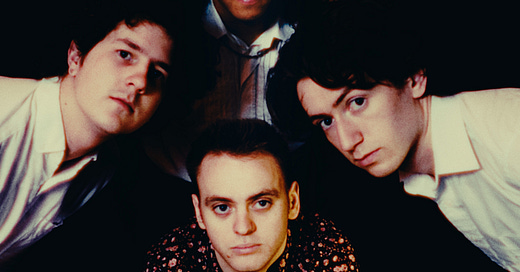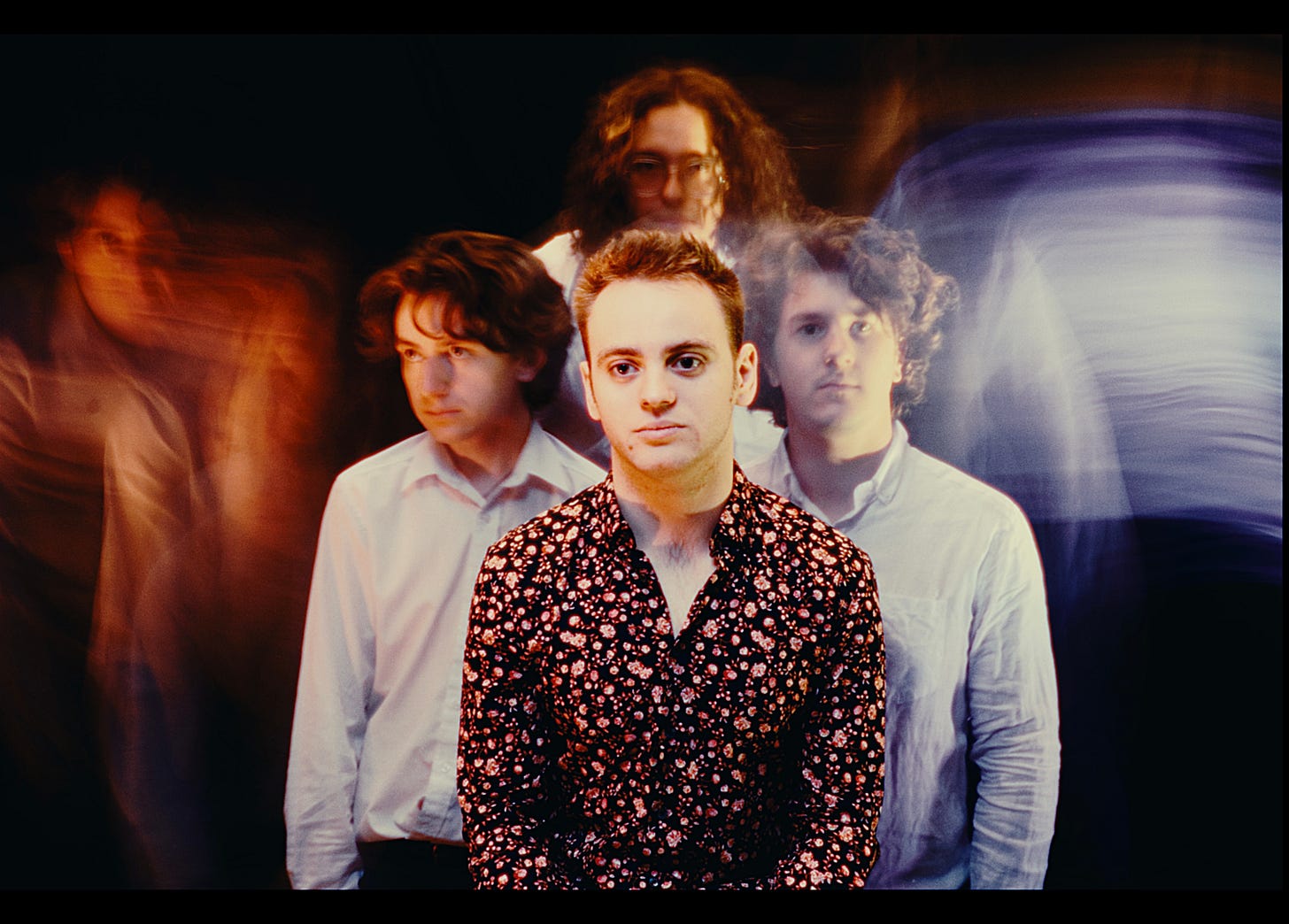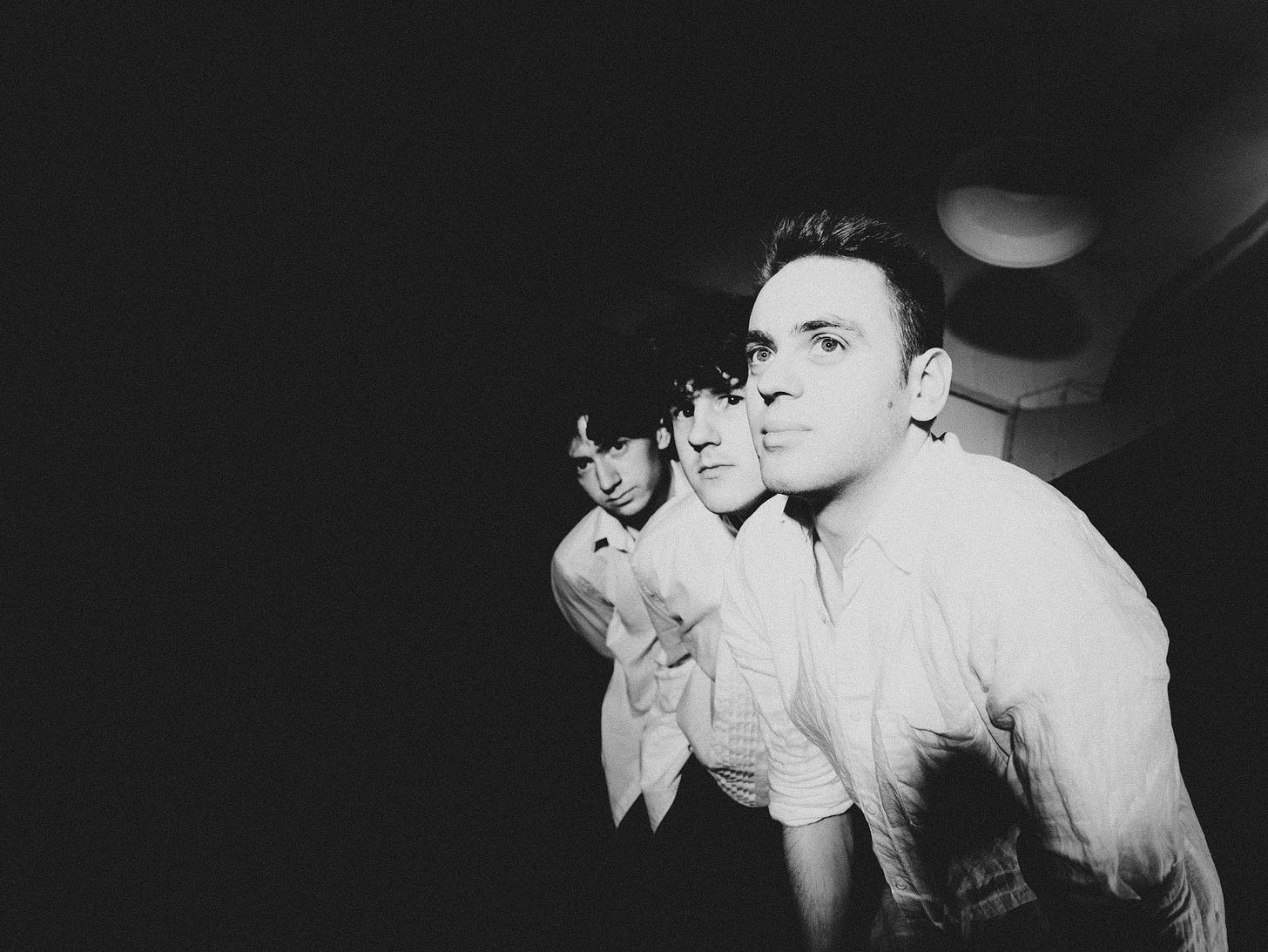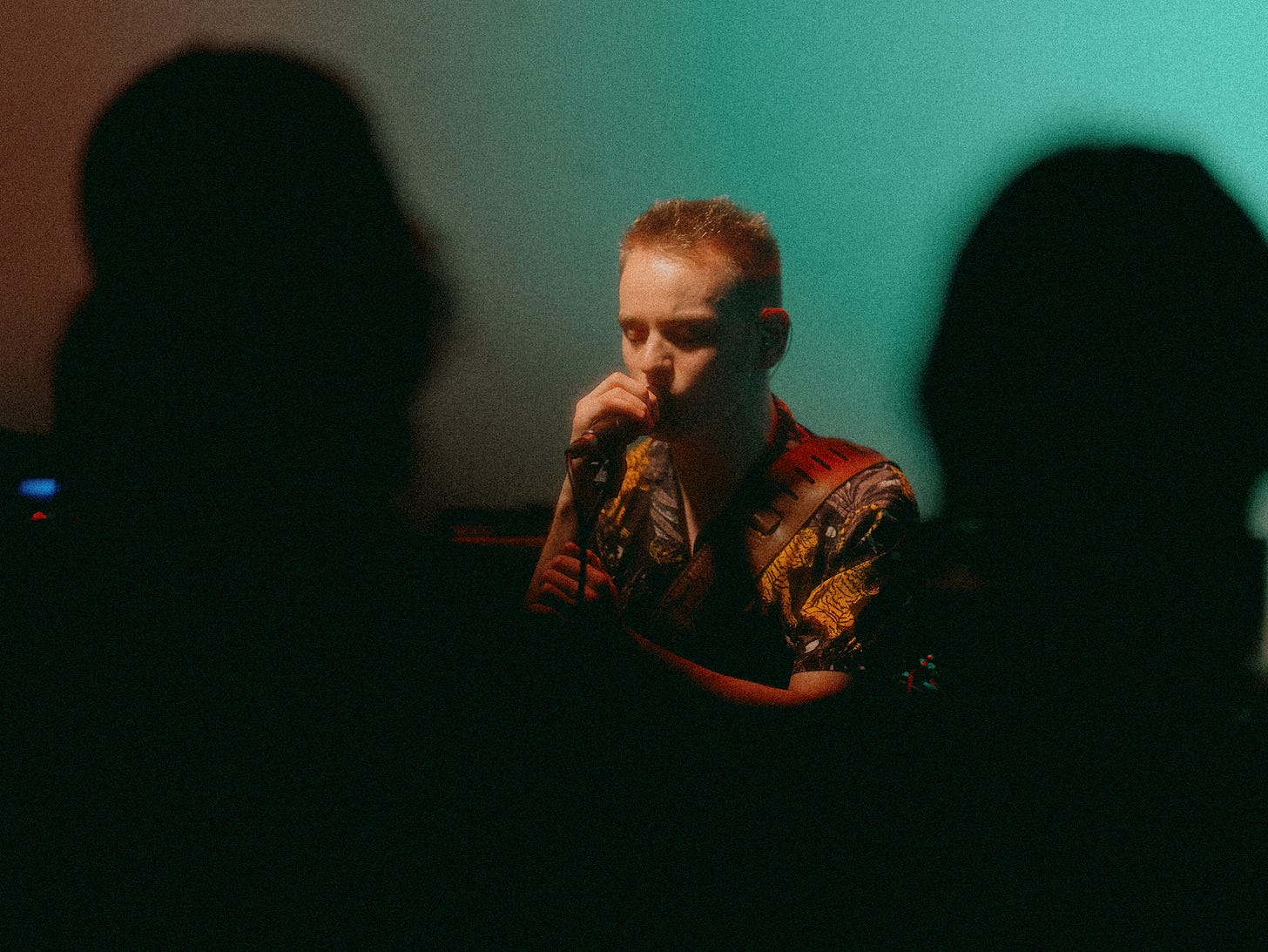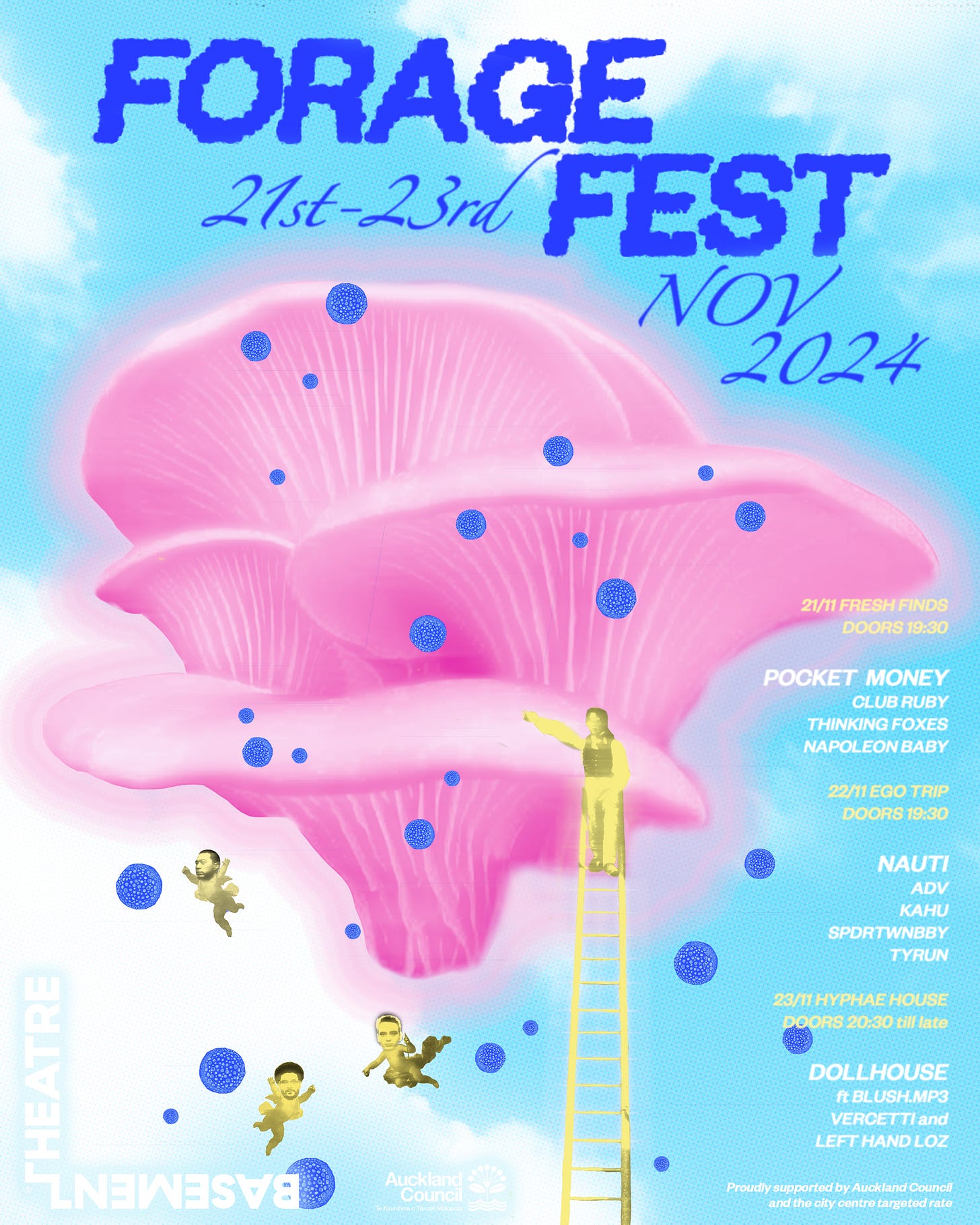An Interview with Thinking Foxes - INTERVIEW
Thinking Foxes are bringing their danceable take on indie rock to Forage Fest 21-23 November. Here they discuss their thoughts on the local music scene, and what they've got in the pipeline.
Thinking Foxes have been K Rd regulars this year, and even secured one of the last performance slots at Wine Cellar. I sat down with Gabe Parkins-Craig, Noah Page, Luca García Ferrari and Taygen Newton to talk about how they got to where they are now, and what’s next for Thinking Foxes as they enter a new era. Thinking Foxes have joined the lineup for Forage Fest, a new music festival that champions the young, new and emerging artists of Tāmaki’s underground, and is completely free to attend.
A. What’s your story? How did Thinking Foxes come to be?
G. The first time we met was at a gig. We played together at Ding Dong in separate bands.
N. It was before then.
G. Oh, was it?
N. Yeah, when you came to UFO. And then I met Daniel [Markham].
G. Oh true, geez! From there, we were just like, we should do more gigs together. Scantily Clad had kind of split apart and Universal Authors was, I guess, fading out. I always had Thinking Foxes on the go, it was just always in the background. And then when Scantily Clad, my band at the time, faded out, I was like, I can put all my effort into that now. I'd known for a while that I wanted to get these two [Noah and Luca] involved. So I was like, please, please, please — because honestly, I don't know what I would have done. The original guitarist, Daniel, who was in Scantily Clad as well, he moved to England, so we needed a very special person, and that's when Luca suggested Taygen. I still remember the first practice at KMC — it was so nerve-racking. Because, both meeting a new person, and then trying to get a new person into the band is like, two very big things. And for both of those to go right on the first time, it's really rare… And yeah, it worked out. Yeah, so good job!
N. You're still here!
G. I mean, we're all still here.
L. It’s been a year and a half?
G. I'd say, two years since first conception…
N. Yeah, it was the beginning of 2022 when we did Bleached.
T. I came in 2023.
N. Yeah — we had Daniel for about a year. But I met Gabe through UFO, but also I recorded an EP for Scantily Clad, and that was kind of how you got to know what I did, really.
G. And I was like, make sure you keep Noah's contact!
N. But that was really weird. You were the first client that I had at Depot by myself. And so I had to go up to Daniel and be like, I run this studio, would you be interested in coming to record? And so it was funny that for both of us, there was skin in the game in that conversation. And it just kind of managed to work out.
A. And then your project that you're working on at the moment is the EP? Is the EP called Lemon Drop? Or doesn't it have a name yet?
G. It doesn't. But for the longest time, I have been thinking of it as the Lemon Drop EP — just because I feel like that is the biggest song of the new direction, or a bit more of a fresh sound.
A. Do you want to talk more about this new direction for the sound?
G. It's a bit more rocky. It's already quite guitar focused music, but it's kind of just pushing it to the next extreme, but not necessarily in the vein of classic rock music. It’s kind of a bit more experimental.
N. It’s not heavy. I'd say, at least, a lot of the new songs that we've been working on are very dance influenced. To me, Bleached is like a classic pop rock song, and pretty down the middle, and the same for No Point. But on the EP, we've started adding synth instrumentation. We've started playing around with different samples and textures and things like that. You know, we all listen to very different music in our own time than what we produce in the band together, and it's really kind of taken until now for us to feel confident in sharing those ideas together and putting them on the page, per se.
G. On the Noah Page.
L. I also think that it’s still really guitar focused music, but it's not guitar led necessarily. The other instruments are pretty cool. I just noticed that the bass and drums start three of the songs. It's a cool difference.
N. I think it's interesting to mention that [Gabe] played bass in Scantily Clad, so a lot of your writing is pretty bass driven as well.
G. I do write quite a lot, starting with bass, just because it's such a fundamental instrument, both in terms of rhythm, but also in terms of melody and where the song starts. And especially with the newer songs, there's still guitars in there, and they're still probably, I would say, one of the main focuses, but I've made a point of trying to start the writing process without guitar and approaching it from, okay, let's start with drums, or bass, or synths, and then let's see what guitars can do to enhance the song, rather than being like, let's see what synths can do to enhance this guitar. And that's been quite challenging at times, but really, really rewarding. And I think it's creating a bit more of a mature sound, which I think is a step in the right direction.
N. I would say recently as well, I have been really impressed by the way that you listen to music. You listen to a lot more sorts of things than I would have expected listening to the music that you write. And I think you are not afraid to write in new ways, or to kind of push us down for a couple months, and we’ll see an influx of demos or ideas that kind of live in that sphere. And then, you know, maybe it's right, maybe it's not, and then a couple weeks later you're doing something different.
G. I definitely agree. Because, even with you saying that now, in the last couple of weeks, I've been doing something completely different, and slowly pushing a bit more fuzzy kind of stuff. There's a lot of music out there, and there's a lot of fun stuff that I don't want to miss out on.
N. Like putting yourself in a box — Yeah, I'm in a guitar band.
G. Yeah, exactly. And a lot of the time with ideas, if I'm like, this reminds me of this or this is too similar to that, I'll just scrap it. You don't want to put out the same song twice, you know, otherwise, you… you become AC/DC.
L. Full respect to AC/DC.
T. I feel like also, because all of us play multiple instruments, but we all play them in different ways, the parts that we write for the songs, even if it'll be a part for someone else's instrument, it'll be different to if they had written it themselves, or if they had come up with the idea, because of listening to different music, but also because we each have our own style of playing. And I think with the EP as it's recorded, it’s definitely more of a combination of all four of us…
G. As opposed to the early stuff, which was definitely like me.
T. The early stuff was like the brainchild — the seed that had to be planted. But it's like only one person can plant the seed.
G. Wise beyond your years.
T. But I think it was a strong foundation to start from and grow out of.
L. I just think it's nice to gain that trust from Gabe to finally get a chance to, with these songs, work on the production together. Past the EP, it's been transcending into co-writing a few things. It's good to get to that spot. I think it works towards the feeling of being a bit more mature as well.
T. Yeah, it means that all of the foxes are doing the thinking.
A. Where do you draw inspiration from?
G. Pffft… everything! I'm always listening to new stuff and new genres.
A. Like what? What's on repeat?
G. That's a really good question…. The wedding band playlist. So a lot of 70s, 80s, yeah… But outside of that, I think my main focus group of artists would definitely be the English rock and alternative scene. Anything from Brit pop in the 90s, up to modern alternative rock coming out of the UK now. I think it's just a really solid few decades of music, and it's still growing. And that's kind of where I draw a lot of my inspiration from. You know like Blur, Radiohead…
T. Arctic Monkeys.
G. Not Arctic Monkeys.
N. Muse.
G. Royal Blood, Nothing But Thieves — those kind of more recent bands.
L. Sam Fender.
G. Love Sam Fender! That's kind of like the main area, and then a lot of the other stuff trickles in from elsewhere, whether that be electronica stuff, or more funk stuff, or dance from the 80s. Love 80s music.
T. Those disco hi-hats.
G. Disco hi hats. I literally can't get away from them. I wrote an idea a couple of nights ago, and I was like, you know what this needs? Disco hi-hats!
T. That's the name of the next track — Disco Hi-Hats.
G. Yeah, That's kind of the root of my inspiration and of my songwriting, but I’m not unaware of the other genres and other sounds that bleed in.
N. I think for me, my inspiration for what I do in the band also comes from my work as a producer. There's a lot of things that I get to do with the artists that I work with, and then there are a whole swathe of things that I don't get to do on a daily basis with the people that come to the studio. Sometimes I get things that are fully finished, and other times they're a lot more open. So it kind of gives me a chance to get to know Gabe and get to know what we ultimately want out of the project, but then also present all these songs in different ways, and try all these things out that I might not necessarily be inclined to do in a session, but sometimes they can work out really, really well. And I've been really excited by the work that we've been putting into our live show recently as well, using all of our combined talents and efforts to really up the production value.
G. I think you can totally hear the difference as well, not only in what we're adding, but also in what we're enhancing — what we're making better and the time that we're spending to create a better sound. I mean, there's still always stuff to work on, of course…
N. Nah, we’re fucking perfect!
G. It's changing, and it's totally going the right direction. It just makes it so much more fun live as well. Because, not only are you proud of the songs you're playing, but it's also like, it sounds so fucking good. I think the next step would probably be lighting and the more visual kind of standpoint.
T. It makes it more interesting for people to listen to if you can tell there's narrative flow throughout the set. And it's not just song, stop, song, stop. It’s having a sonic movement throughout the whole piece — makes it like a symphony.
G. Do you know what a symphony is?
T. It’s got multiple movements.
L. It's a knife.
A. Speaking of live performances, you guys were one of the last artists to play at Wine Cellar.
G. RIP.
A. RIP. What do you feel losing a venue like that does to the community?
T. I think it isolates people from live music, because at least for a band in our situation, finding a venue that's in a location that's easily accessible by public transport and in a place that's sort of central in Auckland, it's hard to find somewhere that isn't prohibitively expensive, because of the age that we are. Losing a place like Wine Cellar, which was very open and accessible, it just takes away from the general scene and… you could get into the whole argument of, now that it’s turned into sort of more of a DJ venue, they’re getting the unhealthy parts of the clubbing experience and culture coming into a place that used to cherish the little guys.
N. And all I can hope for is that out of the ashes of Wine Cellar, either something really exciting and new can grow either there or elsewhere, or it will push us in the band on to explore what else lies out there for us, whether that's playing in new venues or bigger venues, or whatever we need to do, because we still want to obviously get out there.
L. Yeah, fundamentally, I think that's just what happens. Venues, unless they're almost too big to fail, will fail eventually, and that niche gets filled by somewhere else eventually. The Wine Cellar has been gone for three months. You can't hope for something to replace it that quickly, but something will come up — because eventually, either someone's going to find a place that's too cheap not to have as a venue, like cheap to rent, or someone's just going to get so annoyed that there's nowhere else to go that they're just going to start their own venue somewhere. But there are other venues, they're just not quite the same. That place had a lot of special energy, just because it's been around for so long. And you know, Rohan's dedication to the Wine Cellar and Whammy was special, and you really felt it when you played there especially. But there's gonna be another space. Yeah, it'll come out eventually.
A. You guys have played with a lot of other artists as well over the years, and so I guess you guys have quite a good handle on the local scene, the gigging scene, the indie scene. What energy do you feel bubbling away in that scene?
L. That's an exciting question to answer right now. I see a lot of people who are working really hard to build an audience in a way that I haven't seen people do that in the last few years. I find that really impressive, especially a lot of solo projects, like it's just one person's name as the project, doing a lot of work to build themselves up, and not necessarily just through live music, but through releases and through social media, and that's really impressive. And, yeah, we've played with some people who've also just put on really good shows, and that's something that they're fantastic at. Like, Club Ruby works hard on everything. Everything they touch is imbued with so much work behind it that it’s impressive and a little bit daunting to stand next to them and then try to think of yourself as in the same position and doing the same thing, but it's really cool to see them, and to see Kin-Kachow at the time. Yeah, they’re fantastic to see live and to play with and to hang out with. And I just see, fundamentally, a lot of work being done, and a lot of people building foundations that will hold much bigger things in the future.
G. The one thing I see a lot of is so many artists putting out so much work and effort, and it's hard not to compare yourself sometimes as well, and be like, fuck, I'm not doing enough. And you know, you see these amazing bands putting out awesome stuff, both in terms of releases and content, and you're like, this is amazing. I’m impressed every time I go on Instagram or Tiktok. It means that not only is there a drive from artists to do that kind of thing, but also there's enough of an audience building to receive that, and to welcome that and say, hey, that's awesome, I'm gonna support you. It's hard to get a music scene going without artists. The number one fundamental for a music scene is people making music. I mean, that goes without saying, but I think it is often neglected. It's like, if no one's putting in the work ethic and the effort, then no one's gonna reciprocate, no one's gonna come along and that kind of thing. I think that really reflects in people coming along to gigs and interacting online.
L. There's a lot of support for each other also. You wouldn't expect to see other musicians showing up to your gig necessarily, because everyone's busy. You know, every musician has 15 gigs to pick from every Friday, and to see people who eventually become your friends pick you to go support, and to see, and to check out what you're doing feels great. It's nice to sort of see that network build itself.
A. And then something like Forage Fest comes along — what are your feelings going into it?
G. Excited! This kind of thing, we haven't really done before so it's a new space to explore, a new avenue to think about a festival type set, rather than our average headliner set. It brings in new challenges and new things that we haven't really thought of, or different ways to think about things that we've done before.
T. It’s just a new space to play around in and make something that works for that space and that challenge would be fun too.
G. We've played with Club Ruby before, but Pocket Money and Napoleon Baby, I think it would be cool to be in the same space as them and share the same stage and just see more of the Auckland scene, really. And that's just on our night that we're playing — there’s the other two nights, I think they’ll be awesome to see as well. It's just such a breadth of different music out there, different types of performances, so I think it'd be really cool.
T. Playing in a local venue that puts on a lot of shows that I've been to and have thoroughly enjoyed — it kind of feels like giving back for the positive experiences that I've had there in a way that means something to me, and hopefully can mean something to others.
L. What I really like about an event like this is that it legitimises all of the artists that play in it to an audience who doesn't do music. Other musicians will know you don't have to play festivals to be cool or to make great art. But I feel like a lot of audiences who just go to Laneway and listen to musicians not necessarily from the country that they live in, sometimes it takes something like this to see, wow, actually, these people are serious — they're legit, you know? And I think that's really cool to have this opportunity, and be associated with so many great acts along the way.
A. Do you have anything else you want to plug? Do you have any new music coming out? Do you have any other gigs coming around?
N. We have this wedding gig!
A. Sounds a bit exclusive.
G. I mean, we've always got stuff happening, but yeah, just keep an eye on the socials.
N. And stream our three bangers on Spotify.
G. New music in the works.
N. Follow Depot Sound.
T. Follow each of us individually to see what we're up to, because we're all involved in other stuff.
G. And, you know, just listen to music. Just listen to and appreciate music. You never know what's being made next door!
L. Fundamentally, that sounds really vague, keeping an eye on socials, but no joke, it is actually almost done.
G. We are so close. We are so close.


